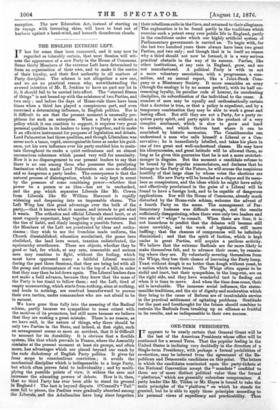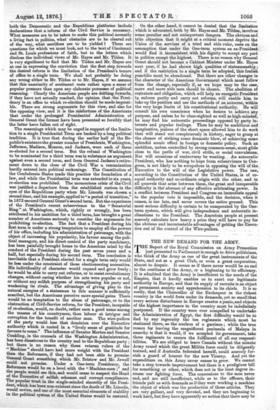ONE-TERM PRESIDENTS.
IT appears to be nearly certain that General Grant will be the last of the American Presidents whose office will be continued for a second Term. That the popular feeling in the United States is inclining very decidedly in the direction of a Single-term Presidency, with perhaps a formal prohibition of re-election, may be inferred from the agreement of the Re- publican and Democratic candidates on this point. The letters in which the candidates nominated upon the party-tickets at the National Convention accept the " mandate " confided to them are of more distinct political value than the formal "platforms," which are generally colourless compromises. A party leader like Mr. Tilden or Mr. Hayes is bound to take the main principles of the " platform " on which he stands for granted, but he is able to apply those principles according to his personal views of expediency and practicability. Thus both the Democratic and the Republican platforms include declarations that a reform of the Civil Service. is necessary. What measures are to be taken to make this political necessity a living fact in politics, what obstacles are to be cleared out of the way, what sacrifices are to be yielded? These are questions for Which we must look, not to the text of Cincinnati and St. Louis professions of faith, but to the letters which disclose the individual views of Mr. Hayes and Mr. Tilden. It is very significant to find that Mr. Tilden and Mr. Hayes are at one in expressing the conviction that the first step towards the desired reform is the limitation of the President's tenure of office to a single term. We shall not probably be doing any wrong either to Mr. Tilden or to Mr. Hayes, if we assume that this unanimity of sentiment rests rather upon a sense of popular pressure than upon any elaborate processes of political reasoning. Clearly the American people are drifting:towards, if they have not actually reached, the opinion that the Presi- dency is an office to which re-election should be made impossi- ble. There are strong arguments for this view, and also for the opposing view, and it is the misfortune of the Americans that under the prolonged Presidential Administration of General Grant the former have been presented so forcibly that the latter have fallen out of sight.
The reasonings which may be urged in support of the limita- tion to a single Presidential Term are backed by a long political tradition. It is true that during the earlier half of the Re- public's existence the greater number of Presidents, Washington, Jefferson, Madison, Monroe, and Jackson, were each of them re-elected for a second term. But the refusal of Washington to be nominated for a third term was in substance an argument against even a second term, and from General Jackson's retire- ment down to the close of the Civil War a renomination hardly entered into political reckonings. The Constitution of the Confederate States made this practice the foundation of a law, and while the Presidential term was extended to six years, re-election was prohibited. The momentous crisis of the Civil war justified a departure from the established custom in the eyes of the Republican party when Mr. Lincoln was chosen a second time, and his example, applied to a period of transition," in 1872 secured General Grant's second term. But the experience of the President's recent subservience to the "Senatorial Ring" at Washington, which, rightly or wrongly, has been attributed to his ambition for a third term, has brought a great number of Americans seriously to consider the arguments for prohibiting re-election. The fact that a President during his first term is under a strong temptation to employ all the powers of his office, including his administration of patronage, with the object of increasing his popularity, his favour among the poli- tical managers, and his direct control of the party machinery, has been painfully brought home to the American mind by the conduct of the President during the past seven years and a half, but especially during his second term. The conclusion is inevitable that a President elected for a single term only would be less under the constraint of these electioneering necessities. His individuality of character would expand and grow freely ; he would be able to carry out reforms, or to resist revolutionary changes, without caring whether his acts were popular or not, or without any selfish purpose of strengthening his party and weakening its rivals. The advantage of giving play to the natural energies of a statesman in this manner is sufficiently manifest, but the Americans perceive more special gains. There would be no temptation to the abuse of patronage, or to the obstruction of Civil-Service reform, for the President, incapable of re-election, would, no doubt, rather earn a good name among the masses of his countrymen, than labour at intrigue and corruption for the benefit of another man. The wire-pullers of the party would lose that dominion over the Executive authority which is rooted in a "lively sense of gratitude for favours to come." The influence of Senator Morton and Senator Conkling, in the counsels of the Washington Administration, has been disastrous to the country and to the Republican party ; but there is no reason why these veteran rulers of the " Machine " should have had more weight with the President than the Reformers, if they had not been able to promise General Grant something which Mr. Bristow and Mr. Jewell could not promise. Under a One-term Presidency, the Reformers would be on a level with the "Machine-men ;" and the people would see this, and would cease to suspect the Head of the Executive of selfish schemes and corrupt compliances. The popular trust in the single-minded sincerity of the Presi- dent, which has been non-existent since the death of Mr. Lincoln, would revive, and one of the most essential elements of stability in the political system of the United States would be restored. • On the other hand, it cannot be denied that the limitation which is advocated, both by Mr. Hayes and Mr. Tilden, involves some peculiar and not unimportant dangers. The obvious and trite objection that it might at a critical moment deprive the Union of the services of a tried and able ruler, rests on the assumption that under the One-term system an ex-President would find it inconsistent with his dignity to accept any part in polities except the highest. There is no reason why General Grant should not become a Cabinet Minister under Mr. Hayes next year, if he had shown high qualities of statesmanship ; and if the restriction to a single term be adopted, this foolish punctilio must be abandoned. But there are other changes in the character of the American Government which must follow from the change, especially if, as we hope may be the case, more and more able men should be chosen. The abolition of restraints and obligation, which will help an energetic President te enforce purity and carry out reforms, will enable him to take up the position and use the methods of an autocrat, within the very large limits of his constitutional authority. He will consult his own conscience when he desires to achieve any purpose, and unless he be clear-sighted as well as high-minded, he may find his autocratic proceedings opposed by party in- terests and popular feelings. Then he may be ambitious and imaginative, jealous of the short space allowed him to do work that will stand out conspicuously in history, eager to grasp at the chance of striking some dramatic blow, of achieving some splendid scenic effect in foreign or domestic policy. Such an ambition, unless controlled by strong common-sense, must glide close to the perils of war, civil strife, or social convulsions. Nor will occasions of controversy be wanting. An autocratic President, who has nothing to hope from subservience to Con- gress, is not likely to be scrupulous in opposing the will of the Executive to the will of the Legislative power. The one, according to the Constitution of the United States, is of co- equal authority and coordinate origin with the other, and in all quarrels that arise between them, the great and insuperable difficulty is the' absence of any effective arbitrating power. In a conflict between President and Congress an immediate appeal to the popular vote is impossible, and the decision, when it comes, is too late, and never covers the entire ground. This most serious difficulty is certain to be exasperated by the One- term system, which will give independence and autocratic in- clinations to the President. The American people at present scarcely calculate how heavy a price they will have to pay for the obvious and incontestable advantages of getting the Execu- tive out of the control of the Wire-pullers.































 Previous page
Previous page